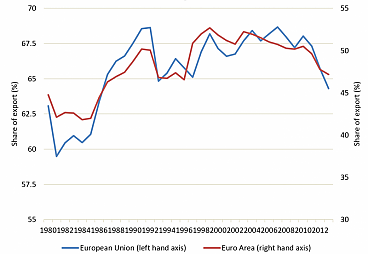Manipulation of economic news
Manipulation of economic news
During the European elections it appeared that the eurocrisis was more or less over. More than that, we were told that it was thanks to the euro that we had so quickly beaten this crisis. A transparent trick: we knew already by then that after the campaigns had ended the economic news would rapidly grow worse. And that’s just what has happened. You have to ask yourself how often Brussels thinks it can treat the electorate like fools.
Since the European elections were held in May, economic forecasts have rapidly worsened. Growth figures have been adjusted downwards and the European Central Bank (ECB) this week took drastic measures in introducing a historically low interest rate together with a still more flexible credit programme for banks. The situation of stagflation – absence of growth coupled with inflation – would, had this not been done, have become similar to that to which Japan was exposed for many years. At the same time it has become known that not only the Greek, but also the Spanish government had polished up its stats in order to present a picture of progress in their countries. It was precisely these figures which were used by the Europhiles during the election campaign to demonstrate that the therapy of punitive austerity had worked. I recently wrote about the panic in Portugal over a bank that was going under and which – how could it be otherwise? – would have to be rescued at a cost of billions. And then the results of the stress-test which all banks in the Eurozone are still to come. We know what’s likely to be revealed then and how many billions we’re likely to have to cough up yet again.
However, what I found most striking was the graph below from the Brussels think tank Bruegel. What does it show? Trade between Eurozone countries has fallen markedly over the last four years, as has trade between EU member states as a whole. The graph tells us a great deal: the euro has proved no advantage in recent years and our dependence on exports to other member states has greatly diminished. And yet we introduced the euro because of all those economic – including trade – advantages.
 Trade between Eurozone countries has fallen greatly during the last four years, just as has trade between EU member states as a whole.
Trade between Eurozone countries has fallen greatly during the last four years, just as has trade between EU member states as a whole.
Of course I recognize that tensions on the EU’s external borders and sanctions against Russia have played a role, but that fails to explain why intra-European trade has fallen so markedly over the last four years. This can actually only be explained with reference to the crisis policy imposed by Brussels on the member states: slim down until you weigh about an ounce. Diminished trade, stagflation, both effects that the SP warned of in the campaign. The figures given now confirm that we were right. It is completely clear that the Europhiles just managed to keep things out of the media, or simply distorted them. This is the best way to ensure that the record for low turnout established in these elections in 2014 will be broken in 2019. Voters won’t sit back and let themselves be swindled. They have the right to be told a tale rooted in the truth, even if that means that the doubts about the euro’s future durability are thereby increased.
- See also:
- Dennis de Jong
